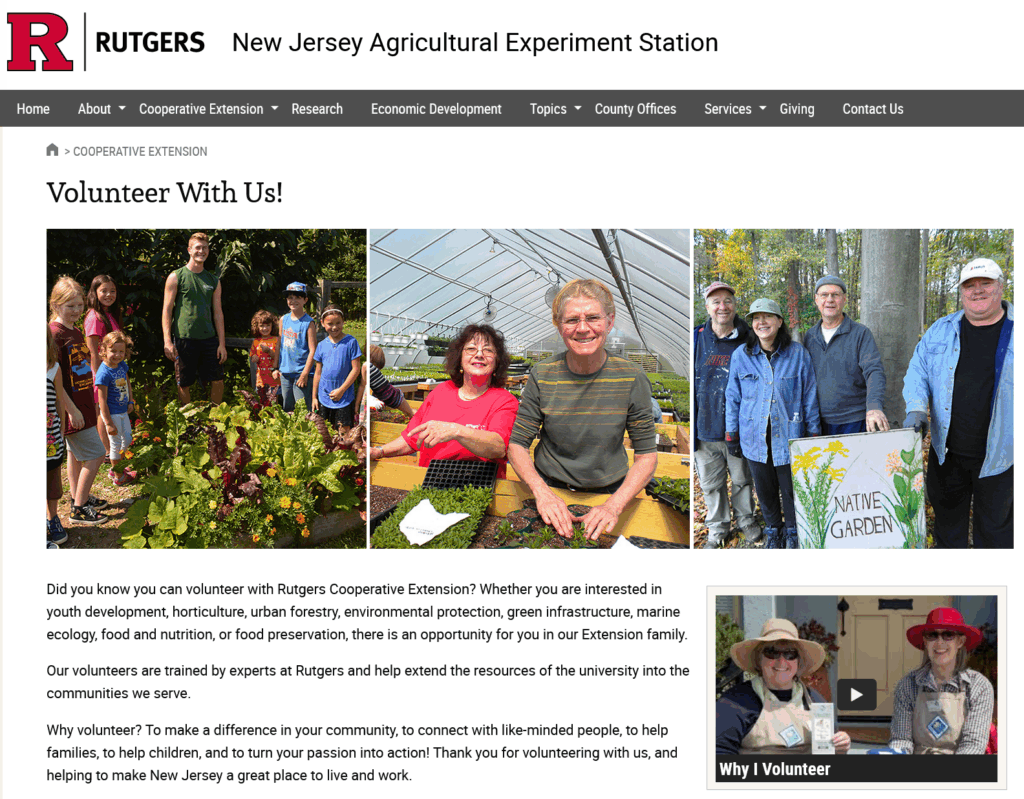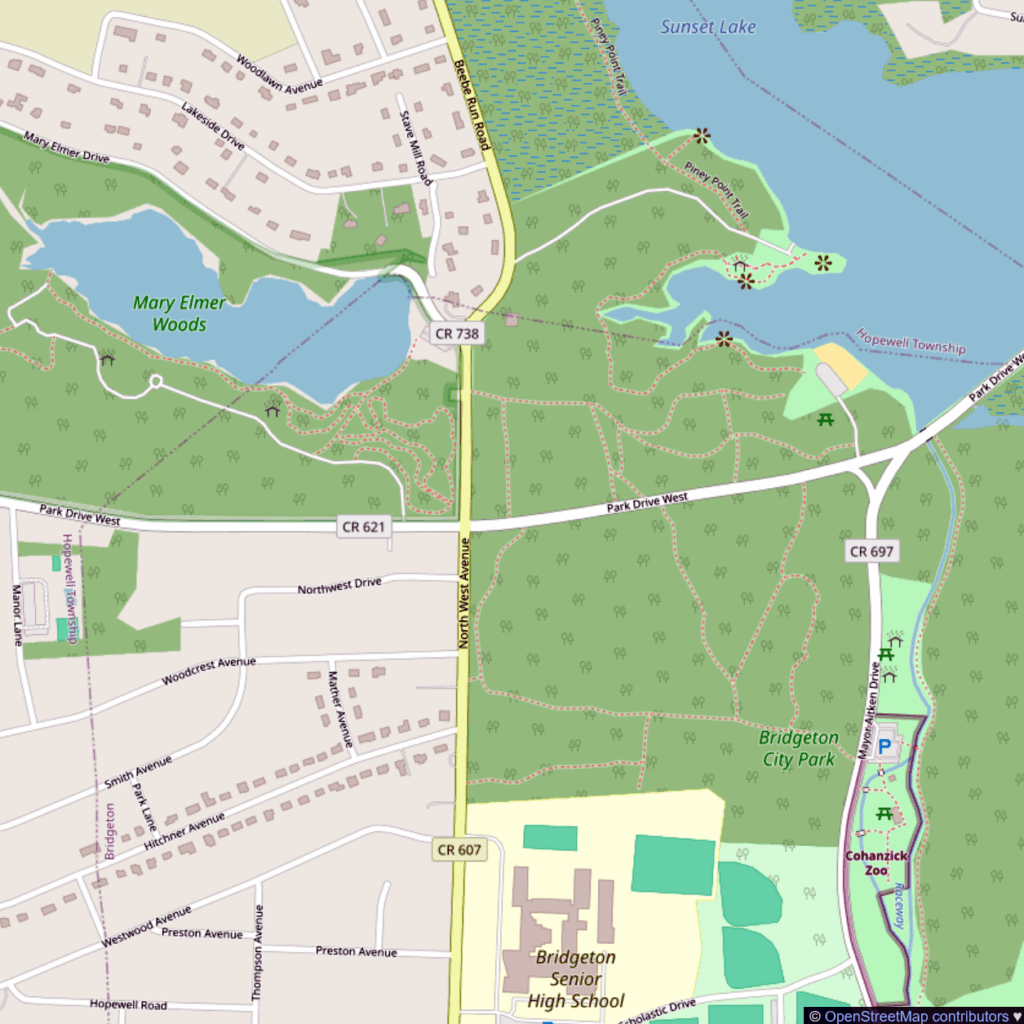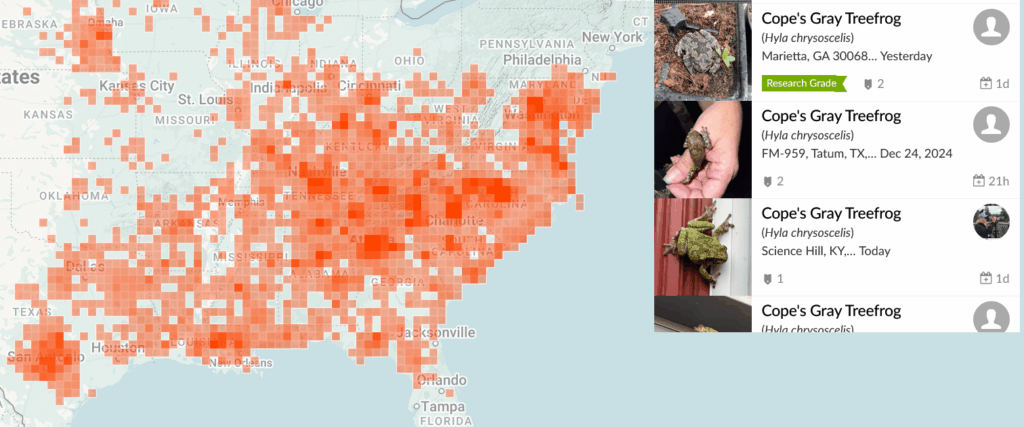Main Content
By Sal Mangiafico, Rutgers Cooperative Extension
Many people are committed to implementing more sustainable practices at home. But often people also want to do more for their community by participating in organizations or groups that may have a larger impact, offer opportunities for challenges and growth, or simply provide more social interaction with like-minded people.
Reasons why people may want to volunteer with sustainability-oriented organizations include:
- For the Impact of It. Working in an organization or team often leads to larger impacts than can be achieved individually at home. There may be opportunities to complete larger projects, educate others, and reach others through publicity.
- For the Mental Health of It. Working with others may provide a better sense of achievement and battle the gloom-and-doom we sometimes feel when considering negative environmental news. (See our latest Earth Day Every Day article on combatting eco-grief.) Being part of a team or project also provides motivation to keep to a schedule and be doing rather than be procrastinating. (See also our Earth Day Everyday Day webinar series this Spring on Environmental Success Stories in New Jersey.)
- For the Learning of It. Volunteering with Rutgers Cooperative Extension or other education-based organizations offer plenty of opportunities for learning. This may be formal instruction delivered in some programs, or the informal learning that comes from working alongside those with deep experience in the topic.
- For the Social Aspect of It. As the opportunities and dynamics of social interaction change over time, people often struggle to find in-person social interactions with like-minded people. Some organizations and volunteer activities provide opportunities to scratch the social itch in a productive and impactful manner.
- For the Community of it. Volunteering on government boards, or working with organizations that interface with the government, can have important impacts on the community. In discussions of environmental issues, we often focus on individual lifestyle changes to create impacts and forget that decisions made by governments and advisory boards on all levels can have large impacts, literally with the swipe of a pen.
Volunteering Opportunities with Rutgers Cooperative Extension
Rutgers Cooperative Extension has a website dedicated to volunteer opportunities for the public ( njaes.rutgers.edu/volunteer/ ).
Every program is different and offers their respective benefits and obligations for participants. Many offer a certification for the completion of the educational component, and some require an ongoing commitment to volunteer activities. Some programs have a fee for the instructional component.

The Rutgers Cooperative Extension Volunteer website.
Environmental Stewards
Participants in the Rutgers Environmental Stewards program receive training on important environmental topics and issues relevant for New Jersey, with an aim to how they can make a difference in their community. Stewards receive certification from Rutgers after completing a volunteer project in their own communities.
Green Infrastructure Champions
water.rutgers.edu/Projects/GreenInfrastructureChampions/GIC.html
Green Infrastructure Champions receive training in green infrastructure planning, design, and implementation, for projects like installing rain gardens and retrofitting detention basins. Participants can receive a certificate from the Rutgers Water Resources Program.
Jacques Cousteau National Estuarine Research Reserve
The Jacques Cousteau National Estuarine Research Reserve covers 116,000 acres of diverse habitats within the Mullica River–Great Bay estuary, one of the least disturbed estuaries in the densely populated Northeast. Volunteers might lead tours, assist with administrative tasks, or support workshops for teachers or children. Volunteers gain new skills and receive training from the Reserve’s expert staff.
Master Food Preservers
njaes.rutgers.edu/food-safety/home-food-preservation
Rutgers Master Food Preservers learn about preserving food by canning in glass jars, freezing, dehydration, and making prepared foods like salsas. They share their knowledge and skills with others through volunteer activities with the Rutgers Department of Family and Community Health Sciences.
Master Tree Stewards
Rutgers Cooperative Extension in some counties offers a Master Tree Stewards program. These Stewards are community volunteers who receive training and earn a Master Tree Steward certificate. Volunteers can then instruct school students about the importance and care of trees.
CoCoRaHS – Community Collaborative Rain, Hail, and Snow Network
www.cocorahs.org/state.aspx?state=nj
CoCoRaHS is a network of volunteers around New Jersey that monitor rainfall and snowfall at their own homes. The data are collected by Rutgers and the State Climatologist and published to give a more detailed accounting of precipitation around the state.
Rutgers Master Gardeners
njaes.rutgers.edu/master-gardeners
Rutgers Master Gardeners are volunteers that provide community education on gardening and related environmental topics, diagnose plant problems for the community, and maintain demonstration gardens at public places. Master Gardener interns receive extensive training on gardening topics and in responding to public inquiries.
4-H Youth Development
4-H is a youth development program with special focus areas in New Jersey of citizenship, healthy living, and science and technology. Children learn leadership, public speaking, teamwork , as well as practical skills. 4-H clubs cover a huge variety of topics from cooking to livestock raising to cooking to robotics. Volunteers can serve as club leaders, chaperones, instructors, or project judges.
Participating in Your Community
There are many opportunities to participate in local government and non-profit organizations close to your home.
Watershed organizations, local environmental organizations, and environmental commissions
There are likely opportunities for you to become involved in local organizations that have a big impact on the environment and your community.
Watershed organizations
Many major watersheds throughout New Jersey have a watershed organization devoted to protecting the watershed, educating the public about local issues, coordinating hands-on projects, and hosting fun events to increase the appreciation of the watershed.
The NJ Map Project has a nice map of major watersheds in New Jersey that helps you determine in which watershed you reside. www.nj-map.com/naturalresources/watershed/. From there, you can search online to see if there is a watershed organization devoted to your watershed.
Also, the Rutgers Water Resources Program has a list of local watershed organizations. Some information may be out of date though. njwrri.rutgers.edu/watershed_orgs.htm.
If you need more help finding a local watershed organization, contact your county’s Cooperative Extension office. njaes.rutgers.edu/county/
Even though it focuses on the Stony Brook-Millstone watershed, The Watershed Institute (thewatershed.org/) serves to some extent as a statewide organization to support and educate watershed organizations across New Jersey.
Local environmental organizations
New Jersey has a wealth of environmental organizations. Some specifically concerned with issues surrounding our coasts, beaches, and bays are listed below in the For the Love of Beaches and Bays section.
Contact an organization of interest to you and see what volunteer opportunities are available.
Become a Citizen Scientist
The Earth Day Every Day program has a webinar on becoming a citizen scientist. Visit envirostewards.rutgers.edu/earth-day-every-day/, and open the Volunteering tab under the Webinar Archive section.
“There are so many exciting opportunities for volunteers to contribute to the collection of scientific data at home or in your community. Be it collecting rainfall data, tracking invasive species, assessing the nightime sky, or tracking monarch butterflies, there is a project for you.”
Municipal Environmental Commissions, Green Teams and Shade Tree Commissions
Many municipalities in New Jersey have a Municipal Environmental Commission. These commissions are official parts of the municipal government, and often have the responsibility to update the Environmental Resources Inventory (ERI) for the town and to review development plans to see if they conform to the goals of the ERI.
These Environmental Commissions may also coordinate local projects with public participation. These may include activities like public educational presentations, lake shoreline plantings, invasive plant removal, or stormwater basin retrofitting.
Environmental Commissions will likely have public meetings, where you can learn more about what is going on in your community and explore chances for you to get involved.
The Association of New Jersey Environmental Commissions (anjec.org/) serves to educate Environmental Commissions throughout the state and is a good resource of information.
In addition, some municipalities have a Green Team. Green Teams usually work in concert with Sustainable Jersey (www.sustainablejersey.com/) coordinating local projects to meet a variety of environmental and sustainability goals. To find out if your municipality has a Green Team, check with your town committee or municipal website.
Your municipality may also have a Shade Tree Commission. Shade Tree Commissions are often responsible for advising the municipality on tree plantings in public spaces such as along streets or in parks. These commissions may help develop a Tree Replacement Ordinance for the municipality, in order to promote native or beneficial shade trees to replace trees that need to be removed. And they may undertake projects to care for municipal trees, just as removing English ivy.
The importance of planning
Many environmental decisions ultimately fall under the auspices of local, county, and state planning. You can participate by attending meetings of your municipal planning, zoning, or land use board. Keep your eyes open for announcements of when County Plans and Cross-acceptance will be discussed at public meetings. Cross-acceptance is the process where municipal, county, and regional plans are compared to the State Plan for consistency.
Just touching grass
Don’t forget that simple actions can have big results. Maybe start or join a local walking group that also collects trash in forest trails or around the city park.
Maybe start or join a local group that does nature walks or kayaking.
Spreading appreciation for natural areas is a big contribution to public consciousness. …And picking up some litter doesn’t hurt!
What If I Really Do Want to Stay on My Screen?
Most of us feel the need to get away from our screens and interact with others in person. However, there are plenty of opportunities to use websites and apps to contribute to the knowledge of local natural and cultural resources.
While there is a plethora of apps that can be used for this purpose, only a few are listed here.
OpenStreetMap
OpenStreetMap is a free and open mapping system where users can contribute locations and features of parks, natural areas, cultural locations, roads, or trails. An account is needed to contribute to the map. Information about these locations can be specified, and phone apps are available that allow the addition of attractions or businesses or more complex features on the go. Adding to the map yields a detailed resource that others can enjoy when exploring natural areas.

Roads, trails, viewpoints, and picnic spots in Bridgeton City Park shown on OpenStreetMap. Many of these features in the park were added by this article’s author.
iNaturalist
iNaturalist is a website and app that allows users to document plant, animal, fungus, and lichen species they encounter with photos, species identification, and location. In aggregate, these locations and identifications make a rich map of where species have been located. Other users can confirm identification from photos, so that amateur users can have some confidence they are contributing correct information. Users are also able to maintain their own species list and photos accessible on their phone for future reference and to rekindle memories.

iNaturalist map of Cope’s gray treefrog in the eastern U.S.
WARN NJDEP
Available on the Apple Store and Google Play.
WARN NJDEP is a valuable app to keep handy. Users can report dumping, wetlands encroachment, sewage leaks, or other environmental concerns. Users can submit a report with photos, description, and location of the incident. Having a camera and a GPS built into the phone in your pocket makes reporting incidents easy.
For the Love of Beaches and Bays
This section is presented with thanks to Doug Zemeckis, Rutgers Cooperative Extension, for supplying material for this section about the many ways that you could get involved with the stewardship of our marine ecosystems and resources.
Marine and Coastal Organizations with Volunteer Opportunities
ReClam the Bay
“ReClam the Bay cultivates and nurtures millions of baby clams and oysters, enriching the ecosystem of Barnegat Bay, Manahawkin Bay, and Little Egg Harbor Bay”
Save Coastal Wildlife
“Dedicated to restoration, research and educating people about the protection of coastal wildlife along the Jersey Shore”
Save Barnegat Bay
“Dedicated to the protection and preservation of Barnegat Bay, serving communities across Ocean and Monmouth Counties”
Barnegat Bay Partnership
“One of 28 EPA designated National Estuary Programs established to protect and restore the water quality and ecological integrity of estuaries of national significance”
New York / New Jersey Baykeeper
“Protect, preserve and restore the ecological integrity and productivity of the waterways and habitats of the New York / New Jersey Harbor Estuary”
American Littoral Society
“Promotes the study and conservation of marine life and habitat, protects the coast from harm, and empowers others to do the same”
Clean Ocean Action
“A broad-based coalition of 125 active boating, business, community, conservation, diving, environmental, fishing, religious, service, student, surfing, and women’s groups, protecting the waters of the New York Bight”
NJDEP – Fish & Wildlife – Wildlife Conservation Corps
www.state.nj.us/dep/fgw/wcchome.htm
“The largest natural resource management volunteer group in the state. WCC members are involved in all phases of New Jersey DEP Fish and Wildlife activities from wildlife research to fishing education”
NJDEP – State Environmental Education Directory
www.nj.gov/dep/seeds/sect8.htm
Includes a list of some volunteer opportunities in the state.
The Nature Conservancy (New Jersey)
www.nature.org/en-us/about-us/where-we-work/united-states/new-jersey/
“Mission is to protect the lands and waters on which all life depends in New Jersey”
ReTurn the Favor (New Jersey)
“A multi-partner program working to rescue overturned or impinged horseshoe crabs stranded on New Jersey’s Delaware Bay beaches”
Alliance for a Living Ocean
www.alolbi.org/events-programs
“From clean-ups to the Longboard Classic – we have something for everyone throughout the year on Long Beach Island, New Jersey”
Conserve Wildlife Foundation of New Jersey
“Work to protect rare and imperiled species through grassroots conservation efforts, innovative enhancement projects, and citizen engagement and outreach”
Partnership for the Delaware Estuary
“A nonprofit dedicated to connecting people, science, and nature for a healthy Delaware River and Bay”
Wetlands Institute
“A science-based organization with a mission to preserve, protect, and steward our wetlands and coastal ecosystems”
Project Terrapin
“A volunteer, conservation, and education initiative to support the Northern Diamondback Terrapin and its habitat through research”
Marine Mammal Stranding Center
Brigantine, NJ. “Stranding Volunteers are added to a call list where the Stranding Technicians may reach out when there is a stranding in the volunteer’s area, requesting any assistance”
Water Quality
Jersey-Friendly Yards
Jersey-Friendly Yards Certification Program for your home, business, or community
Save Barnegat Bay – Watershed Watch
savebarnegatbay.org/how-you-can-help/watershed-watch/
“Help us identify and address potential threats at their source”
Citizen Science
Plastic Wave Project – Microplastics Monitoring
plasticwaveproject.org/microplastics
“The goal is to take a closer look at how microplastics accumulate on local beaches along the Jersey Shore”
Barnegat Bay Partnership – Paddle for the Edge
barnegatbaypartnership.org/protect/restoring-barnegat-bay/volunteer/paddle-for-the-edge/
“Paddle for the Edge can be completed in either the Barnegat Bay-Little Egg Harbor Estuary or the Great Egg Harbor Bay”
My Coast – Document our Changing Coast
“The New Jersey portal is used to collect and analyze photos of coastal events and places. Photos are linked to data about weather and tides to create reports that help stakeholders like government agencies, business owners, and residents”
Preventing Marine Debris – Opportunities
BoatUS – Monofilament Recycle Bin
www.boatus.org/monofilament/build-a-bin
“Building and monitoring a fishing line recycling bin is one of the best things you can do to protect your favorite fishing spot”
NOAA Marine Debris Program
marinedebris.noaa.gov/monitoring/marine-debris-monitoring-and-assessment-project
“Using this standardized collection method, suite of helpful resources, and publicly available data, participants and volunteers can detect differences in marine debris over time”
NJ Clean Communities
www.njclean.org/resources-home
Resources and programs for achieving a litter-free community.
Marine Debris – Rutgers Cooperative Extension of Ocean County
ocean.njaes.rutgers.edu/marine/debris/
Opportunities to prevent marine debris in Ocean County.
References
Bakacs, M. 2025. Eco-grief got you down? Here’s what you can do about it . Earth Day Every Day News Blast. January. salem.njaes.rutgers.edu/2025/01/17/eco-grief-got-you-down-heres-what-you-can-do-about-it/.
[NJAES] New Jersey Agricultural Experiment Stations. No date. Volunteer With Us! njaes.rutgers.edu/volunteer/